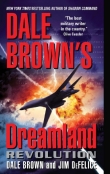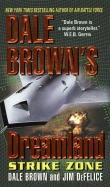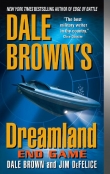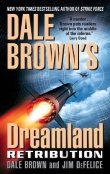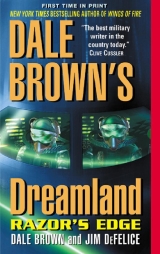
Текст книги "Razor's Edge"
Автор книги: Dale Brown
Жанр:
Боевики
сообщить о нарушении
Текущая страница: 10 (всего у книги 22 страниц)
He had to lean forward to put his soda and sandwiches down.
“Those sandwiches are about a week old,” said Mack.
“Check ’em for mold before you take a bite.”
Zen bit into them defiantly. He was halfway through the second when Danny Freah, Chris Ferris, Captain Fentress, and the two mission specialists crewing Quicksilver came in. Fentress had a map rolled up under his arm, along with a pair of folded maps in his hand.
“Majors, Captain,” said Danny. “Just talked with Major Alou. He’s inbound. We want to have a briefing over in the trailer as soon as he’s down. CentCom is going to nail that SA-2 site we picked up and they need our help.”
“Is that what got the Tornado?” Zen asked.
“No one’s sure,” said Danny. “At this point it’s possible he wasn’t even shot down. But CentCom wants to hit something, and it’s the biggest target in the area. Even if it didn’t get them—and I don’t think it did—it should be taken down.”
“How close were the MiGs Major Stockard saw?” Breanna asked O’Brien.
“It’s possible they could have gotten the RAF flight if they were using very long-range missiles,” said Chris Ferris, answering for the radar specialist. “But we didn’t sniff anything in the air, and as far as we know, the AWACS didn’t have any contacts either. Not even the Eagles could find them.”
“Nothing,” added O’Brien. “If they fired Alamos, we would have known it. Their guidance systems would have given them away.”
“Alamos with heat sensors,” suggested Zen. The Alamo missiles—Russian-made AA-10s—came in at RAZOR’S EDGE
183
least three varieties, including a heat-seeker. But the longest-range version known to the West, the AA-10C, had a range of roughly twenty-two miles and used an active radar, which would have been detected. The infrared or heat-seeking version would have a much shorter range.
“Million-in-one shot,” said Ferris.
“Alamos at twenty-five miles?” said Mack. “What the hell are you guys talking about?”
As Ferris explained, Zen looked at Breanna. She was still steaming, he could tell. He tried to send his apology via ESP, but it didn’t take.
“Had to be a laser,” said Mack when he heard the details. “Only explanation.”
“So where is it, then? With the SA-2s?” said Ferris.
“Shit, they’d hide it in a mosque or something,” said Mack. “You know these ragheads.”
“That might be right,” said Danny.
“Maybe it’s with one of these radars that flicks on and off,” said Zen.
“Possible,” said Ferris. “On the other hand, none of the sites seem large enough to house an energy weapon.”
“It doesn’t have to be that big,” said Zen. “Razor’s not big at all. It moves a tank chassis.”
“I don’t think the Iraqis could make it that small,” said Ferris.
“I bet it’s in a mosque,” said Mack.
“Whatever size, they’d try to make themselves as inconspicuous as possible,” said Bree.
“There—we look for what’s inconspicuous,” said Mack.
He meant it as a joke, but nobody laughed.
“Our best lead is the radars,” said Zen. “Because even if it were mobile, it would have to be getting a feed from them somehow. Maybe it can go from one unit to another.”
184
DALE BROWN’S DREAMLAND
“Or they have a dedicated landline, with high speed connections, fiber optics,” suggested Bree.
“You really think the Iraqis can do that?” said Ferris.
“They’re doing something,” said Mack.
“I think I can narrow the area down on where that Slot Back radar was if you give me a half hour,” said O’Brien.
“It wasn’t briefed. There may even be another one down there, though the signal was really weak. I’ll tell you one thing,” he added, “either the operator is damn good or they’ve got some sort of new equipment down there, because the computer couldn’t lock it down.”
JENNIFER GLEASON FOLDED HER HANDS OVER HER MOUTH
and nose almost if she were praying. She had only a rudi-mentary notion of how the coding for the program governing the IR detection modes worked, and without either the documentation or the raw power of Dreamland’s code analyzers, she could only guess how to modify it. The secure data-link with Dreamland was still pending; once it was in place, she would be able to speak with the people there who had developed the detector. But the pilots wanted the plane to fly before then, and she thought it shouldn’t be that hard to figure out. She replayed the EB-52’s recorded inputs from the last mission, watching the coding to see how she might tweak the IR detector to find a momentary burst in the infrared spectrum.
Shorter than a launch, but stronger?
Jennifer reached for her soda on the floor of Quicksilver’s flight deck, pulling it up deliberately. She took two sips and then set it down, all the while staring at the blank multipurpose screens at the radar-intercept operator’s station. She ran the detection loops over again, watching her laptop screen where the major components of the code were displayed. The interface program took data from different sensors and configured it for the RAZOR’S EDGE
185
screens; it was monstrously complex because it had to accept data from a number of different sensors, which had been designed without a common bus.
Her laptop flagged a bug in the interface that had to do with an errant integer cache. It was minor—the interface program simply ignored the error.
Odd. It should have been trapped out by the interface.
The error handling section was comprehensive, and in any event included an “if all else fails” section where anything unexpected should have gone.
But it hadn’t. Jennifer traced the error to an ambient reading from the sensor. The detector had flicked onto something and sent a matrix of information about it on to the interface. The interface didn’t understand one of the parameters.
An error in the sensor that hadn’t been caught during the rigorous debugging of the interface at Dreamland?
Certainly possible. Happened all the time.
Except …
Jennifer reached down for her soda again. It could just be an error—there must have been a million lines of code there, and mistakes were inevitable.
But if it wasn’t a mistake, it would be what they were looking for.
Well, no, it could be anything. But anything wasn’t what she was interested in. She needed a theory, and this was it.
She could get a base line with some flares, see what happened, try to screw it up. Use those numbers to compare to the error, calculate.
Calculate what, exactly?
Something, anything. She just needed a theory.
If Tecumseh were here, she thought, he would tell her to figure it out. He would fold his arms around her and rub her breasts and tell her to figure it out.
186
DALE BROWN’S DREAMLAND
Jennifer jumped up from the station, scooped up her can of soda, and ran to find Garcia.
Incirlik, Turkey
1230
TORBIN FINISHED HIS TAE KWON DO ROUTINE, BOWING TO
the blank wall. He was alone in the workout room, still a leper despite the semiofficial admission from General Harding that his gear and the mission tapes checked out; he wasn’t at fault in the shoot-downs.
Not at fault, but impotent nonetheless. The Phantom remained grounded until further notice. Its next flight would undoubtedly be to the boneyard.
Torbin folded his arms at his sides, trying to maintain his composure. He belonged back in the rear seat of the Weasel, back over Iraq. They could nail the damn radars one by one, no matter what bullshit tactics they were pulling. Hell, maybe he could jimmy around with the gear somehow and scope out their tactics.
Whatever.
Something heavy roared off the nearby runway.
Ought to be me, he thought, deciding to run through his routine again.
High Top
1300
THE HEAT WAS SO HIGH IN THE TRAILER, DANNY FELT SWEAT
rolling down his neck as he studied the map. On the other side of the table Major Alou finished telling the others about CentCom’s plans. There was no doubt now that RAZOR’S EDGE
187
Iraq had some sort of new weapon or weapons. Six planes had been shot down; four men were still missing. The ratio of sortie to loss was just above twenty to one. Even the most conservative reckoning of the statistics from the Gulf War put the sortie-to-loss ratio well over a hundred to one. Maybe it wasn’t a laser, but something big and bad was going down.
“They’re bringing in a pair of U-2s from the States to increase surveillance,” said Alou, “but they’re worried about how vulnerable they’ll be, and in any event they won’t arrive for another twenty-four hours or so. The game plan in the meantime is to take out every radar and missile site we can find.”
“The bastards keep rolling them out,” said Chris Ferris.
“They’ve been keeping them in the closet, or what?”
“They’ve spent the money they got for food the past five years on rebuilding their defenses,” said Alou.
“Damn country’s starving while Saddam’s buying new radar dishes and vans. The missiles they’ve had. They just haven’t fired them until now.”
“They’re not on long enough to hit anything,” said O’Brien. “Has to be a laser.”
“They might be synthesizing the radar input,” said Ferris. “If you had a sophisticated computer, you could compile all of the inputs from a diverse net, then launch. No one radar would ever stay on long enough to seem like the culprit. They could move the radars around, use some and not others—that would explain why they duck the Weasels and the other jammers.”
“Pretty sophisticated,” said O’Brien.
“Jennifer said it’s doable,” said Ferris. “And then they barrage launch at the contacts. That’s what they’re doing.”
“We’re jamming like hell. Guidance systems ought to be confused.”
188
DALE BROWN’S DREAMLAND
“Maybe they’ve improved them,” said Ferris.
“If that is what’s going on,” said Zen, “then what we should do is nail the coordinating site.”
“How do we find it?” asked Breanna.
“We follow the communications net,” he suggested.
“Listen in. See where the center is. That’s what Quicksilver’s good at.”
“I still think it’s a laser,” said Mack. “Got to be.”
“Sure,” said Zen. “But we can find that the same way.
Instead of looking for the weapon, we look for the guidance system. That’s how Weasels work, right? They nail the radar van.”
Danny straightened from the map. He felt like the odd man out as they continued to discuss the situation and what to do. He felt like he ought to contribute something, help plan a mission somehow. He and his guys were sitting on the ground playing babysitters—literally, with the Kurd kid Liu had plucked out.
Protecting the planes was an important job. Still, the Marines provided more than enough security, and the Navy Seabee guys they’d brought in with them were going great guns expanding High Top—if they had their way, it would be the size of O’Hare in another forty-eight hours.
So Whiplash was free to do more important things.
Like?
“All right,” said Alou. “Let’s work up some surveillance tracks to coincide with the missions for CentCom.”
“You know it seems to me that if this radar computer gear is that sophisticated, we ought to try to get a look at it,” said Danny. “Get pictures, data, that sort of stuff.”
“Hey, Captain, why don’t we just grab it?” said Mack.
He probably meant it as a put-down—Smith could be a real asshole—but the idea struck Danny as eminently doable.
Or at least more interesting than babysitting.
RAZOR’S EDGE
189
“If I can get a Chinook or a Pave Low in here, we could take it out, no sweat,” said Danny.
The others seemed to ignore him.
“I still think it’s a laser,” said Mack.
“That would be worth taking,” said Danny. “Big-time.”
Finally, everyone realized he was serious. The conversation stopped; they all turned and looked at him.
“We could,” said Danny. “Or at least get intelligence about it.”
“You serious?” asked Zen.
“Shit yeah.”
“Unnecessary risk,” said Alou. “Even if we could find it.”
“Risk is our job,” said Danny. He knew he was pushing further than reasonable, but what the hell—Whiplash was created exactly for missions like this. Besides, except for the target, it was a straightforward armed reconnaissance mission behind enemy lines. Anyone could do it.
Pretty much.
“We’re not even positive where the site is,” said Breanna. “We don’t have a target for you, Danny.”
“So get me one.”
AS THE OTHERS FINISHED WORKING OUT THE DETAILS FOR
the missions, Zen wheeled himself through the narrow door and down the ramp. A gray CH-46E Sea Knight or
“Frog” was just arriving, bringing in more Marines. The two-rotored helicopter looked like a scaled-down version of the more famous Chinook—though in fact the development had been the other way around, with the Frog coming first.
Darkening the sky behind the Marine helo was an Osprey, just tipping its wings and rotors to land. The MV-22
was Whiplash’s chariot of choice, twice as fast as most helicopters, with considerably longer range.
190
DALE BROWN’S DREAMLAND
Zen wheeled toward Quicksilver’s parking area. He’d rejected numerous suggestions that he get a battery-powered chair—definitely a macho thing—but at times like this, skidding through potholes and ducking rocks, even he would have admitted it’d be useful.
He hadn’t apologized to Bree. He knew he’d have to, and the sooner the better—stale apologies were even more difficult to make.
Send flowers or something. Blow her away if he could get them up here.
Jennifer Gleason and Louis Garcia were standing beneath Quicksilver’s tail, pointing at the large black semi-sphere and wire guts of the coverless IR sensor above.
“Hey, how’s it going?” he shouted, rolling toward them.
“Lousy,” Jennifer told him. “I tried to recalibrate the programming and now there’s a bad circuit on the sensor.
It’s going to take at least an hour to get it working.”
“An hour? We’re supposed to take off then. Forty-five minutes, actually.”
“Oh,” said Jennifer.
“I can get this back together quicker than a rolling stone,” said Garcia. “But then I have to help prep the plane.”
“Okay.” Jennifer took a strand of her hair and pulled it back behind her ear. “We’ll toss flares off the Flighthawk.”
“What for?”
“I want to see what the data sequence should be.
There’s an error I’m trying to make sense of.”
“I can launch the flares, no sweat.” Zen glanced toward the U/MF already loaded onto the Megafortress’s wing.
“Good. I’ll grab something to eat and my flight gear.”
“Hold on, cowboy.” Zen whirled his chair across her path as she started to duck away. “Who says you’re coming with us? It’s a war zone.”
RAZOR’S EDGE
191
“And Somalia wasn’t?” Jennifer put her hands on her hips defiantly. “If there is a laser out there, you need me in the air. Don’t worry, Jeff, I can take care of myself.”
“I didn’t say you couldn’t.”
“Hmmmph,” she said, stomping away.
“I’m having a bad day with women,” Zen said softly.
“Honey, give me just one more chance,” sang Garcia.
“Huh?”
“Just a song, Major.”
“Garcia—is everything in life a Dylan song?”
“Pretty much.”
Dreamland
0523
“TEST CODE CHECKS, SIR,” SAID THE LIEUTENANT AT THE
communications desk in the secure situation room triumphantly. “You’re good to go.”
“Make the connection,” said Dog. He stood in the middle of the floor in front of the screen, waiting for the transmission from Turkey. The test pattern on the screen blipped blue. The words CONNECTION PENDING appeared in the middle of the screen.
He wanted to talk to Jennifer in the worst way. But of course that wasn’t what this was about.
“Hey, Colonel, good to see you finally,” said Danny.
The screen was still blank.
“Well, you can see me but—wait, there we go,” said Dog as the video finally snapped in. Danny Freah sat at the table in the Whiplash trailer. His eyes drooped a bit at the corners, but his face and hands were full of energy.
Before Dog could say anything, Danny launched into an argument for undertaking a ground recon of the Iraqi Razor clone.
192
DALE BROWN’S DREAMLAND
“And hello to you too, Captain,” said Dog when he finally paused for a breath.
“It’d be a real intelligence coup,” said Danny. “We could use the helmets to beam back video. Then we can take key parts back.”
“Do we know where it is?”
“No, sir. But the missions they’re on now—they’ll find them.”
“Assuming, of course, it exists.”
“Hell, if we can get some help, we could grab the whole thing.”
“Let me get Rubeo and our Razor people down here to talk about this,” said Dog. “It may be useful.”
“It’ll be damn useful.”
“Relax, Captain. From what I’ve heard out of CentCom, they’re not even one hundred percent sure it’s a laser. No one can explain how Saddam would have built it.”
“If it’s not—let’s say it’s a radar and missile setup we don’t know about—we should take a look at that too,”
said Danny. “See what they’re up to. Jennifer Gleason suggested that they may have some way of taking a lot of different inputs and cobbling them together. Software for that would be worth grabbing too, don’t you think?”
“Captain, while I don’t want to dampen your enthusiasm,” said Dog, “why don’t we take this one step at a time. How about an update on your status?”
“Sure,” said Danny. He gave him a complete rundown, working backward from the last mission. Then he told him about the baby who’d been born the previous night. It sounded like just the thing the Pentagon PR people would eat up—except, of course, that the mission was code-word classified, and would undoubtedly remain so.
“Kinda makes you a grandpa, huh, Colonel?” said Danny.
RAZOR’S EDGE
193
“I don’t think so,” said Dog. “What kind of shape are our people in?”
“Top notch, sir.”
Danny’s mention of Jennifer gave him the perfect excuse to talk to her—he ought to hear about her theory from her, he thought. Certainly if it were Rubeo or one of the other scientists, he’d ask to talk to him directly.
But Dog hesitated. He didn’t want to cross over the line.
Of course he should talk to her.
“Is Dr. Gleason there?” he asked, finally giving in. “I’d like to hear her theory on the radars.”
“She’s up with the Megafortresses, sir,” said Danny.
“She’s going on a mission.”
“Mission?”
“Yes, sir. They’re modifying the IR detection gear to search for lasers.”
Dog pursed his lips but said nothing.
High Top
1510
MISSION PREPPED, BREANNA GAVE IN TO AN IMPULSE BEfore heading back up to the Megafortress and jogged over to the baby’s tent after relieving herself in the Marines’
new latrine. She wanted to see the cute little guy before she took off.
For good luck. Just for good luck.
She expected mother and child would be sleeping, but as she neared the tent she heard laughter. The tent was crowded with Whiplash members and Marines, who were taking turns holding and cooing the infant.
“Guarding against a sneak attack?” said Bree, trying to squeeze inside.
194
DALE BROWN’S DREAMLAND
“Can’t be too careful about colic,” said one of the men, deadly serious.
“Well, let me hold him for good luck,” she said, sliding near Sergeant “Powder” Talcom, who was holding him.
The sergeant gave the baby up very reluctantly.
“You’re a cute one,” she said, gently cradling the baby.
Little Muhammad Liu looked at her with very big brown eyes. Then he furled his nose and began to cry.
“Aw, Captain, you made him cry,” said Powder, immediately reaching for the infant. The other men closed in; Bree suddenly felt very outnumbered.
“There there,” she told the infant, rocking him gently.
“Aunt Breanna isn’t going to hurt you.”
The baby sniffed, burped, then stopped crying.
“You got the touch, Captain,” said one of the men.
“Well, I’m quitting while I’m ahead,” she said, handing the baby off.
Iraq Intercept Missile Station Two, northern Iraq 1510
MUSAH TAHIR ROSE FROM HIS PRAYER MAT AND BOWED
once more in the direction of Mecca before starting back to his post in the radar van. For the past three days Allah had been remarkably beneficent, rewarding his poor efforts at improving the Russian radar equipment with fantastic victories over the Americans. Volleys of missiles—a combination of SA-2s, Threes, and Sixes—had brought down several aircraft.
Or at least his commanders told them they had. Tahir was aware only of his own small role in the war as both technician and operator. He had studied engineering at MIT as well as the Emirates, and in some ways this job was a million times below his capability. But fate and Al-
RAZOR’S EDGE
195
lah had brought him here, and he could not argue with either.
Tahir settled on his narrow metal bench before the two screens he commanded and began his routine. First, he made sure that each line of the Swiss-made system in the console on the left was working, punching the buttons methodically and greeting the man on the other line with a word of peace and a prayer. When he reached the third line, there was nothing—Shahar, the idiot Shiite, no doubt a traitor, once again sleeping at his post. Tahir waited patiently, speaking the man’s name at sixty second intervals, until after nearly ten minutes the observer came on the line.
“Planes?” Tahir asked, cutting off Shahar’s apology.
He knew the answer would be no—he had not received the warning yet from the spies at Incirlik that the infidels’
planes had taken off. But the question would serve as a remonstrance.
“No,” said the man.
“Remain alert,” snapped Tahir, hanging up. He sat back at his console, frowning as one of the guards walked past his doorway. There was only a small security contingent here, a half-dozen men; anything larger might have attracted the Americans’ attention. Besides, so far behind the lines, there was no need for troops. Tahir several times had considered the fact that the men had probably been posted here to keep an eye on him.
That was hardly necessary. He went through the other lines quickly. When he had determined that all were operating, he proceeded to the next set of checks. These were more difficult, involving the buried cables that ran from the various collection sites. More than two dozen radars and six microwave stations were connected to Tahir’s post via fiber-optic cable that had been buried at great ex-pense, in most cases before the infidel war. If it were laid 196
DALE BROWN’S DREAMLAND
out end to end it would no doubt reach Satan’s capital in Washington.
Only two of his sites had been hit in the morning’s bombardments. That was well within acceptable parameters. At this pace, it would take the Americans a full week to eliminate his radars. By then the army would be out of missiles anyway.
Tahir glanced at the television monitor in the corner, then picked up his cell phone and adjusted the headset. When that was on, he carefully placed the second headset—a Soviet-made unit older than he—over it. He had to position it slightly to the side so he could hear from both sets, but the trouble and the pressure against the edge of his ear and temple were worth it; he could talk and monitor his radar at the same time. Prepared, he let his glance sweep across the console before him one last time, then drew his body upward with a great breath, exhaling slowly as he delivered his trust to Allah, waiting for the alert.
Aboard Quicksilver , over Iraq 1602
ZEN HELD HAWK ONE EXACTLY SEVENTY-FIVE METERS BEhind Quicksilver’s tail, waiting for the signal to hit the flares. The Megafortress’s airfoil shed air in violent vortices, and holding the position here was actually more difficult than closing in for a refuel.
“I need another few seconds,” said Jennifer, fingers violently pounding one of the auxiliary keyboards at the station next to him. “Hang tight, Zen.”
“Yup.”
“You ready upstairs, O’Brien?” she asked. “I need you to initiate sequence two right now.”
RAZOR’S EDGE
197
“Sequence two initiated,” said the electronic warfare officer.
“Zen, on my signal …”
“Okay, Professor.” Zen nudged his power ever so slightly as the Megafortress tucked forward, riding an eddy in the wind.
“Now.”
“Bingo,” he said, punching the flares, which were ordinarily used to decoy IR missiles.
He couldn’t tell whether the test had worked or not, and neither O’Brien nor Jennifer said anything. Zen held his position, wanting to get on with things. But such was the life of a test pilot—weeks, months, years of routine, spiced by a few seconds worth of terror.
“All right. That worked well. I think we’re okay,” said Jennifer. “Let’s do it at one mile.”
“Two minutes to border,” said Breanna.
“Acknowledged, Quicksilver,” said Zen. He tucked his wing, hurling Hawk One toward the ground as he started to loop out to the launch point for the flare. Jennifer wanted him to pickle it as close to the ground as possible and had calculated a precise angle, twenty-two degrees from the sensor. Zen tucked down toward a wide rift, his altimeter marking his altitude above the valley at a thousand feet.
“I’m going to put it at fifty feet,” he told Jennifer. A large cliff loomed on his right; he nudged the Flighthawk onto its left wing, clearing the rocks by twenty feet. A wide valley opened up in front of him. A river sat near the center of it. His speed had dropped below 200 knots.
Sliding his nose forward, he ducked below seven hundred feet, six hundred, burrowing into the valley.
“Almost there,” he said as he passed through five hundred feet.
198
DALE BROWN’S DREAMLAND
“Transmission!” yelled Habib, breaking in over the interphone circuit.
“You’re at the right angle,” Jennifer told Zen.
“Five seconds,” said Zen, concentrating as the Flighthawk slid down below a hundred feet.
“Transmission—I have an American voice—Guard band!”
“Hawk leader, hold off on the test,” said Breanna calmly. “Habib, give us a location.”
“Trying!”
“What?” asked Jennifer.
“We have one of the downed pilots,” Zen told her. He pulled level, did a quick check of his instruments, then started the preflight checklist on Hawk Two, still sitting on Quicksilver’s wing.
“He’s behind us. I don’t have the location—I can’t—he said he saw us fly overhead,” said Habib, his stutter no doubt matching his heartbeat.
“He saw Hawk One,” said Breanna, her voice almost quiet. “Zen, tuck back up the valley. We’re going to slide back around. Habib, get us a good location. Chris, talk to the AWACS and tell them what we’re up to.”
“I’d like to launch Hawk Two,” Zen told Breanna.
“Let’s hold that until we have a good location on the flier,” she said. “I don’t want anyone getting distracted up here.”
“Hawk leader.” Zen banked Hawk One back in the direction it had just come from. He had the radio at full blast but could hear nothing; reception in the Flighthawks was extremely limited. Then again, Quicksilver’s standard radio wasn’t picking up the signal either. Only the sophisticated gear Habib controlled was capable of finding and magnifying the faint signal, which was undoubtedly being distorted and weakened by the rocky terrain and towering mountains.
RAZOR’S EDGE
199
“You’re headed back toward him,” Habib told Zen.
“He can’t see you, but he hears something.”
“Could be bogus,” said Breanna.
“Aware of that, Quicksilver. RWR is clean.”
“I concur,” said O’Brien.
“You’re overhead—he thinks you’re at about fifteen thousand feet.”
“Tell him I’m about a fifth of the size of an F-15,” said Zen. “I’m a hell of a lot lower than he thinks.”
“I can’t talk back to him,” said Habib. His listening gear was just that—built for listening, not talking. They’d have to wait until they got close enough for Quicksilver’s set to make contact.
Zen magnified the visual feed ten times but saw nothing but large rocks. A cliff loomed ahead; he climbed, deciding to circle above the hills where he wouldn’t have to worry about running into anything.
“I still don’t have him on standard Guard band,” said Chris over the interphone. “Can you pipe your input into our radios?”
“Negative,” said Habib.
“Are you sure you have his location right?” asked Breanna.
“I don’t have it nailed down,” said Habib. “But we’re very close.”
“I have a radar,” said O’Brien. “Slot—no, I’m not sure what the hell it is.”
Zen’s RWR went red, then cleared.
“Clean,” said O’Brien.
“Hawk leader copies. I had a blip too. Jen?”
“I can’t tell if it was a blurp or the real thing,” she said.
“He’s lost you,” said Habib. “I lost him.”
“I’m going to goose a couple of flares over that valley where he must have seen me,” said Zen. “Let’s see if that wakes him up.”
200
DALE BROWN’S DREAMLAND
High Top
1620
DANNY FREAH WATCHED AS THE MARINES OFF-LOADED
gear from the transport helicopter, ferrying large bundles out the rear to a six-wheeled trolley that looked like something they’d borrowed from a Home Depot outlet. A separate crew of Marines, meanwhile, refueled the CH-46E from one of the barrels of fuel it had brought with it.
One of the pilots hopped out of the cockpit, ambling over to say hello.
“Have a cigar?” The Marine, tall but fairly thin, had left his helmet in the chopper. He had at least a two-day-old beard, so rare for a Marine in Danny’s experience that he wondered if the pilot was a civilian in disguise.
“Don’t smoke,” said Danny. “Thanks anyway.”
“Hey, not a problem,” said the pilot, who took out a pocketknife to saw off the end of the short cigar. “You’re Captain Freah, right?”
“Yeah?”
“Name’s Merritt.” He took out a Colibri lighter and lit the cigar, sending a pair of thick puffs into the air before continuing. “Friend of yours asked me to say hello. Hal Briggs.”
“You know Hal?”
“I do some work for him, every so often. A lot of these guys in the MEU do, SF stuff,” said the pilot, adding the abbreviation for Special Forces. Danny knew that his old friend Hal Briggs was deeply involved with covert actions for ISA, but operational secrecy meant he was hazy on the details.
The pilot exhaled a thick wad of smoke. There was a decent wind, but Danny still felt his stomach turning with the scent.
“Hal says you’re outta your mind if you’re predicting RAZOR’S EDGE
201
the Yankees make it to the World Series. He wants Cleveland,” said the helo pilot.
“Hal doesn’t know shinola about baseball,” Danny told the pilot. “Cleveland. Where’s their pitchin’?”
“Cleveland? Ha!” A laugh loud enough to be heard two or three mountains over announced the arrival of Captain Donny Pressman, the pilot of the MV-22. Pressman was a sincere and at times insufferable Boston Red Sox fan.
“Now, if you want to talk about a team—”
“Bill Buckner, Bill Buckner,” taunted the Marine, naming the first baseman whose error had cost Boston the World Series against the Mets several years before.



